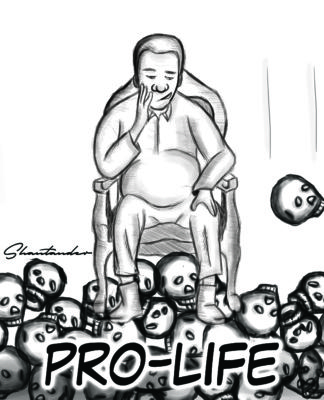THE LEGAL fight is not over.
Three dismissed instructors at the College of Fine Arts and Design (CFAD) have filed a motion for reconsideration before the National Labor Relations Commission (NLRC) following a March 26 ruling in favor of the UST administration.
“The CFAD professors said they will push through [up to] the Supreme Court, because it’s the right thing [to do]. The collective bargaining agreement (CBA) and the Labor Law were violated by UST [officials],” Reynaldo Reyes, UST Faculty Union vice president for grievance and complaints, said.
NLRC’s latest decision reversed the March 17, 2011 ruling of the Office of the Labor Arbiter, which found the dismissal of the instructors against UST illegal. UST had filed two motions for reconsideration before the NLRC.
The decision said UST “cannot be held liable for illegal dismissal” as it “only acted pursuant to the mandate of law” in removing CFAD instructors Raymond Son, Raymund Antiola, and Wilfredo Pollarco from employment.
Clarita Carillo, Vice Rector for Academic Affairs, said in an e-mail to the Varsitarian that the recent decision supports the University’s stand on the issue of requiring master’s degrees for faculty members.
“The University owes it to its various stakeholders, even to its 400-year-old history and tradition of excellence, not to compromise its quality standards,” she said.
The instructors filed separate charges against University officials before the NLRC on July 5, 2010 for alleged illegal termination after their refusal to sign waivers issued by the Office of the Vice Rector for Academic Affairs and Research.
The waiver required non-tenured faculty members without master’s degrees to renounce their right to tenureship.
Two years ago, UST decided to strictly implement Commission on Higher Education (Ched) Memorandum Order 40, series of 2008 (CMO 40), or the Manual of Regulation for Private Education of 2008 (Morphe).
Section 35 of the Morphe states that a faculty member can only be tenured in a higher education institution when he is “a holder of master’s degree,” and, if applicable, a holder of the appropriate professional license.
Section 1A, Article 15 of the 2006-2011 CBA, meanwhile, states that previously hired faculty members are given five semesters to earn a master’s degree, otherwise they will be removed from service.
“UST agreed that despite [the fact that a faculty member] is in absence of a master’s degree, if they are rehired after the fifth semester, they are deemed tenured,” Reyes pointed out.
Pollarco, Antiola, and Son had taught for more than five years in CFAD.
But the latest decision of the NLRC stated that “the provisions [of CMO 40] should take precedence over the CBA, considering that the former has the force and effect of the law.”
Reyes said that while it is correct that CMO 40 must take precedence, the University in effect waived the memorandum’s provisions when it signed the CBA.
The University should have helped faculty members without post-graduate degrees instead of terminating them, especially after the Ched’s instruction in 2010 for higher educational institutions to follow CMO 40, he said.
“Our contention is that the Ched memorandum in 2010 itself does not say that those who continue teaching without master’s degrees will be terminated. Rather, it is addressed to the University, [for it to] strengthen and implement CMO 40,” he said. “In other words, it is to help those faculty members who were hired without the required degree to finish it.”
Reyes also expressed his doubts that the University is in full compliance with CMO 40.
“If UST was strict in the implementation, and if CMO 40 is necessary and mandatory, how come it allowed faculty members without master’s degrees to continue teaching once they signed the waiver and terminated those who were not willing to do so?” he said.
Moreover, the complaint is against violations committed by some University officials, and not against UST, Reyes said.
“The clean name of the University should be preserved, and one way of preserving that is to fight for what is right,” he said. “Our complaint is actually to preserve the integrity of the University against malpractice violations, not by [UST] but by those people in those positions.”
The Varsitarian sought statements from Son, Antiola, and Pollarco, but they have yet to respond. Nigel Bryant B. Evangelista
















